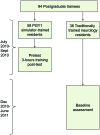Simulation-based education with mastery learning improves residents' lumbar puncture skills
- PMID: 22675080
- PMCID: PMC3390539
- DOI: 10.1212/WNL.0b013e31825dd39d
Simulation-based education with mastery learning improves residents' lumbar puncture skills
Abstract
Objective: To evaluate the effect of simulation-based mastery learning (SBML) on internal medicine residents' lumbar puncture (LP) skills, assess neurology residents' acquired LP skills from traditional clinical education, and compare the results of SBML to traditional clinical education.
Methods: This study was a pretest-posttest design with a comparison group. Fifty-eight postgraduate year (PGY) 1 internal medicine residents received an SBML intervention in LP. Residents completed a baseline skill assessment (pretest) using a 21-item LP checklist. After a 3-hour session featuring deliberate practice and feedback, residents completed a posttest and were expected to meet or exceed a minimum passing score (MPS) set by an expert panel. Simulator-trained residents' pretest and posttest scores were compared to assess the impact of the intervention. Thirty-six PGY2, 3, and 4 neurology residents from 3 medical centers completed the same simulated LP assessment without SBML. SBML posttest scores were compared to neurology residents' baseline scores.
Results: PGY1 internal medicine residents improved from a mean of 46.3% to 95.7% after SBML (p < 0.001) and all met the MPS at final posttest. The performance of traditionally trained neurology residents was significantly lower than simulator-trained residents (mean 65.4%, p < 0.001) and only 6% met the MPS.
Conclusions: Residents who completed SBML showed significant improvement in LP procedural skills. Few neurology residents were competent to perform a simulated LP despite clinical experience with the procedure.
Figures



Comment in
-
Does experience doing lumbar punctures result in expertise? A medical maxim bites the dust.Neurology. 2012 Jul 10;79(2):115-6. doi: 10.1212/WNL.0b013e31825dd3b0. Epub 2012 Jun 6. Neurology. 2012. PMID: 22675079 No abstract available.
References
-
- Huang GC, Smith CC, Gordon CE, et al. Beyond the comfort zone: residents assess their comfort performing inpatient medical procedures. Am J Med 2006;119:71. - PubMed
-
- American Board of Psychiatry and Neurology. [Accessed July 24, 2011]. Available at: http://www.abpn.com/neuro.html.
-
- American Association of Neurology. [Accessed July 28, 2011]. Available at: http://www.aan.com/go/about/sections/curricula.
-
- [Accessed July 28, 2011]. Accreditation Council for Graduate Medical Education Neurology Program Requirements. Available at: http://www.acgme.org/acWebsite/RRC_180/180_prIndex.asp.
-
- American Board of Internal Medicine. [Accessed August 10, 2011]. Available at: http://www.abim.org/certification/policies/imss/im.aspx.
Publication types
MeSH terms
Grants and funding
LinkOut - more resources
Full Text Sources
Medical
Miscellaneous
